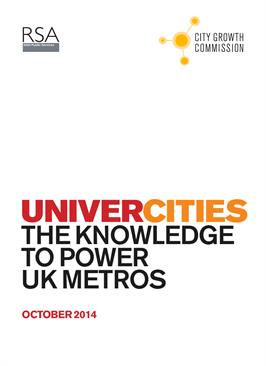In the last RSA City Growth Commission report before the Commission’s Final Report is released on October 22nd, UniverCities makes recommendations for universities to enhance their economic impact on UK metros – our largest cities and their surrounding areas. 72 of the UK’s 123 universities are in our 15 largest metro areas.
The government invests over £7 billion of public funds in the higher education sector each year to maintain the quality and competitiveness of its teaching and research.
However, the financial and performance incentives which universities respond to are largely agnostic to the location of their impact. Competing in the global economy, universities will serve as increasingly important ‘anchor institutions’ in UK cities.
They are already playing a key role, driving forward innovation in the knowledge economy and contributing to a skilled workforce by attracting the best global talent.
Given the importance of tertiary education and the global standing of our leading universities, mainstream funding for HEIs should continue to be based on standards of excellence for research and teaching.
However, to respond to growth opportunities related to workforce skills and industrial innovation within the local metro area, the Commission suggests a range of measures to maximise the local and regional economic growth benefits from university activities.
Introducing ‘ReFreshers weeks’ with universities campaigning for graduates to stay in the local area by offering advice, matching them to employment and volunteering opportunities, and helping them find housing.
Developing a centralised ‘graduate clearing’ system which pools rejected graduate recruitment applications and recycles them to local firms with vacancies. Similar to the UCAS clearing scheme, graduates who have not found a place in corporate schemes being connected to other firms, including SMEs, looking to recruit.
Enabling ‘golden handcuffs’ arrangements to reward commitments from graduates to work locally. Industry associations, start-up incubators, or university careers services could attract subscriptions from firms to support a student loan repayment bonus, made after a loyalty period ends.
Thirdly, enterprise among students, graduated and academics should be encouraged.
-
Partnering with business networks across the metro. HEIs should co-invest with BIDs and industry partners to support start-up incubation and acceleration space located in innovative urban districts.
-
Allowing ‘Core Cities’ to pilot a more flexible ‘graduate entrepreneur visa’ which would encourage more international students to start a business in the UK after graduation.
-
Investing in the Entrepreneur First model of seed investment programmes, selecting on the basis of technical talent in STEM subjects.
-
Expanding flexible course provision. University courses should, by default, allow sandwich years for employment and enterprise. Students should have access to an enterprise module as suggested by the Young Review.
pdf 875 KB

Be the first to write a comment
Comments
Please login to post a comment or reply
Don't have an account? Click here to register.